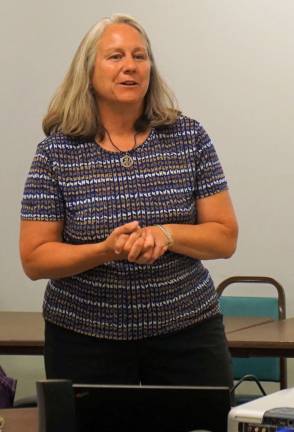Woman's Club learns about child safety

VERNON — In addition to the April general meeting, the Vernon Township Woman's Club arranged for Injury Prevention Coordinator K.J. Feury, of Morristown Medical, to review safety issues.
Feury spoke of: “Injury Prevention and Safety — at home, on the road, and at play.”
Due to families extending into multi-generational households under one roof, Feury encouraged everyone to be more conscious of child dangers leading to long term issues.
A new area of concern is button batteries found in: keys, remotes, bathroom scales, phones, and singing greeting cards.
Feury said, “We want to get out of the habit of children playing with phones and keys.”
She showed — in a video — the after effects of a one year-old swallowing a battery, discovered three days later in the back of the throat. The child required: 10 surgeries, 100 x-rays, nine weeks in the ICU, and 2 inches removed from the esophagus. Afterwards, the child still has a gagging, rasping breathing pattern.
Feury explained, the batteries set up an electrical current through the tissue, causing damage.
She added, poison control centers say a majority of deaths are caused by remote controls. Most of the time people do not realize the child ingested the battery until a couple of days later — after the child becomes sick — and time has been wasted. For more information see: safekids.org.
Another new safety issue Feury reviewed was furniture and TV tip-overs, caused since the onset of flat-screen TV's. Typically, she said, when people upgrade their TV, they place the old one on an old dresser. However, if a child steps on the drawer in order to get to the remote, it can be deadly as the furniture and TV fall down on the child.
She said flat screen TV's should be secured to the wall; and older TV's should be placed on low, stable pieces of furniture. Safety straps may also be used to hold TV to the furniture, with straps attaching the furniture to the wall.
Some other topics Feury covered were: hospitals send new parents home with a cardboard box, little mattress, and instructions to place their infant on the back while sleeping in order to minimize the risk of SIDS — Sudden Infant Death Syndrome; everyone should place the Poison Control number: 800-222-1222 in their cell phone; medicine should be administered using the dosing device provided — not a kitchen teaspoon; one should keep a running list of when and how much medication was given to a child or one's self; opiate prescriptions should be guarded from teens, young adults, and visitors to one's home; remaining prescription opiates should be disposed of at police departments or hospitals — not dumped in the garbage; medicines, Tylenol — the number one overdosed drug for children — and other over-the counter drugs should be stored out of a child's reach; and children should be supervised constantly around pools or ponds.
Feury said their regional trauma center sees about 3,000 patients each year, with 60 percent suffering home falls. In contrast to 25 years ago, she said, the majority of accidents used to be motor vehicle crashes. The change is due to people living longer and being prescribed a lot of medication.
Regarding falls, Feury suggested getting help for putting things away in the attic and cleaning gutters. She explained, broken hips are life changing for people over 65, so “use caution and be patient. Things don't have to get done right away.”
She said, the greatest strides have been in preventing road injuries. People are driving slower, safer distances, and avoiding drinking and driving. However, a new problem is phone distraction. Feury urged people to put away and turn off their phones while driving.
Feury also warned of dangerously challenging other cars while driving in a hurry and recommended slowing down in school zones, residential, and high pedestrian areas, even if not marked. The incidence of survival, she said, for a pedestrian hit by a vehicle going 25 miles-per-hour is significantly better than 30 miles-per-hour.
Other car safety reminders from Feury were: children must be in the back seat until age 12 and in a booster seat until 8 or around 80 pounds; after 80 pounds and around 4'9”, children may use a lap/shoulder belt; and drivers should wear — and verify passengers are wearing — seat belts.